You are currently browsing the category archive for the ‘Orthodox Sermons & News’ category.

The Assembly of Canonical Orthodox Bishops of the United States of America strongly disagrees with the United States Supreme Court decision of June 26, Obergefell v. Hodges, in which the Court invents a constitutional right for two members of the same sex to marry, and imposes upon all States the responsibility to license and recognize such “marriages.”
The Supreme Court, in the narrowest majority possible, has overstepped its purview by essentially re-defining marriage itself. It has attempted to settle a polarizing social and moral question through legislative fiat. It is immoral and unjust for our government to establish in law a “right” for two members of the same sex to wed. Such legislation harms society and especially threatens children who, where possible, deserve the loving care of both a father and a mother.
As Orthodox Christian bishops, charged by our Savior Jesus Christ to shepherd His flock, we will continue to uphold and proclaim the teaching of our Lord that marriage, from its inception, is the lifelong sacramental union of a man and a woman. We call upon all Orthodox Christians in our nation to remain firm in their Orthodox faith, and to renew their deep reverence for and commitment to marriage as taught by the Church. We also call upon our nation’s civic leaders to respect the law of Almighty God and uphold the deeply-rooted beliefs of millions of Americans.
Source: http://assemblyofbishops.org/news/2015/response-of-assembly-of-bishops-to-obergefell-v.-hodges
A sermon almost providential given 2 weeks ago
Orthodox Christians Must Now Learn To Live as Exiles in Our Own Country
No, the sky is not falling — not yet, anyway — but with the Supreme Court ruling constitutionalizing same-sex marriage, the ground under our feet has shifted tectonically.
It is hard to overstate the significance of the Obergefell decision — and the seriousness of the challenges it presents to orthodox Christians and other social conservatives. Voting Republican and other failed culture war strategies are not going to save us now.
Discerning the meaning of the present moment requires sobriety, precisely because its radicalism requires of conservatives a realistic sense of how weak our position is in post-Christian America.
More here: http://time.com/3938050/orthodox-christians-must-now-learn-to-live-as-exiles-in-our-own-country/


Thousands of pilgrims to the tomb of our Savior Jesus Christ have witnessed and received the Holy Light in Jerusalem today, April 11th 2015. The Holy Fire came down at 14:15 local time. The Patriarch of Jerusalem Theophilos the III together with hierarchy, priests and faithful surrounded in procession thrice the Holy Sepulcher. While they chanted “Oh Joyful Light”, the Patriarch undressed of his vestments, and after allowing himself to be searched by the police to prove that he is not carrying any device that can light up any candle inside the Holy Tomb, he entered into the Holy Sepulchre, and keeled before the marble slab covering the tomb, where an unlit candle and a prayer booklet for the invocation of the Holy Fire were waiting for him.
The Patriarch came out of the Holy Sepulchre caring the Holy Light and sharing it with the priests and the faithful that were waiting outside the Holy Sepulcher.
CHRIST IS RISEN!

The Holy Light is not simply a miracle. It is the wonder of wonders
Patriarch Irenaeus the Ist was ordained a deacon in Jerusalem in 1969 and held the patriarchal seat between 2001 and 2005. In a discourse we had in June 2009, he described very clearly those moments he lived as a patriarh during the ceremony of the Holy Light. The most important part of the dialogue that we had, is as follows:
– Your Beatitude, does the miracle take place after you finish reading the special prayer (the prayer for the invocation of the Holy Light) or during the prayer?
– Sometimes while I’m still saying the prayer.
– What happens in that moment?
– Suddenly, the entire tomb is filled with light. It is a pale blue light. It is a very moving moment, you lose yourself… It is a blue flame that fly and fills the entire Tomb … It is not easy to express it in words.
– How do the candle bundles you hold in your hands lit up?
– The moment I extol the four bundles of 33 candles each, they immediately ignite from the blue flame that spreads through the air. After few minutes the blue flame becomes a ordinary yellow flame.
– It is true that in those moments the Holy Fire does not burn?
– Indeed!. The Holy Fire does not burn at all in those first moments. During the time I attended the ceremony as a patriarch, no hair from my beard was ever burned. Unfortunately, there are those who mock this wonder. Among them are some with cassocks. As the iconoclasts once existed, so today we have the aghiofotomahii (those that fight against the Holy Fire). May God grant them repentance to cease to blaspheme against it. The Holy Light is not simply a miracle. It is the wonder of wonders.
From Haralambos K. Skarlakidis, The Holy Light. The miracle of Holy Saturday at the Tomb of Christ


In the ancient times, it was customary for the hermit’ monks who during Great Lent withdrew in the desert to fully dedicate themselves to prayer, to meet again on Palm Sunday at their hermitage in the Church to celebrate together the Passion Week and the Resurrection of our Lord. In memory of this old tradition on the eve of Palm Sunday at Vespers it is sung: Today the grace of the Holy Spirit gathered us together, and taking Thy cross, we sing: “Blessed is He that cometh in the Name of the Lord, Hosanna in the highest!’ The byzantine choir: ,,Tropos” sings the idiom ,,Today the Grace of the Holy Spirit”, melos by Pétros Filanthídis, in the 6th tone:
In the Middle East, the Islamic State is crucifying Christians and demolishing ancient churches. Why is this being met with silence from the halls of US Congress to Sunday sermons?
Last August, President Barack Obama signed off on legislation creating a special envoy charged with aiding the ancient Christian communities and other beleaguered religious minorities being targeted by the Islamic State.
The bill was a modest one — the new position was given a budget of just $1 million — and the White House quietly announced the signing in a late-afternoon press release that lumped it in with an array of other low-profile legislation. Neither Obama nor any prominent lawmakers made any explicit public reference to the bill.
Seven months later, the position remains unfilled — a small but concrete example of Washington’s passivity in the face of an ongoing wave of atrocities against the Assyrian, Chaldean, and other Christian communities of Iraq and Syria.
The Islamic State has razed centuries-old churches and monasteries, beheaded and crucified Christians, and mounted a concerted campaign to drive Christians out of cities and towns they’ve lived in for thousands of years. The Iraqi city of Mosul had a Christian population of 35,000 when U.S. forces invaded the country in 2003; today, with the city in the hands of the Islamic State, the vast majority of them have fled.
Every holiday season, politicians in America take to the airwaves to rail against a so-called “war on Christmas” or “war on Easter,” pointing to things like major retailers wishing shoppers generic “happy holidays.” But on the subject of the Middle East, where an actual war on Christians is in full swing, those same voices are silent. A push to use American aircraft to shield the areas of Iraq where Christians have fled has gone nowhere. Legislation that would fast-track visa applications from Christians looking to leave for the United States never even came up for a vote. The White House, meanwhile, won’t say if or when it will fill the special envoy position.
More here: http://foreignpolicy.com/2015/03/12/the-real-war-on-christianity-iraq-syria-islamic-state/

About 14 million children – more than the populations of Washington State and Massachusetts combined – are living every day with extreme violence, the hardships of displacement, and the mental aggression of extremist ideology, according to UNICEF, the United Nations agency charged with promoting the welfare.
“As Syrian civil war enters fifth year, the situation of more than 5.6 million children remains desperate” according to UNICEF
Hundreds of thousands of Syrian and Iraqi children have been displaced, along with their families, and now live in camps in unfamiliar places – Lebanon, Jordan, Turkey, and Egypt. For many, schooling is an opportunity of the past, leaving as the only options menial labor and, for growing numbers of girls, childhood marriage.
For many who do stay put, schooling now means an education in the ideology of the self-described Islamic State (IS), with lessons in intolerance of non-Muslims.
According to UNICEF, almost 2 million Syrian children live in areas where the humanitarian aid does not reach, and approximately 2.6 million children are no longer attending school.
For the youngest children, the crisis in Syria is all that they known; for adolescents, the violence and suffering have not only marked their past but they are shaping their future. […]
The UNICEF statements joins a long list of reports and cries of alarm from humanitarian officials and international children’s rights groups marking the fourth anniversary of the Syrian civil war, which began in March 2011.
That sense of deep failure by world powers and the international community has carried across many of the statements marking the Syrian anniversary.
With no end in sight to the fighting, the ranks of the 14 million children affected by conflict in Syria and Iraq will only grow, UNICEF says.
The position in support homosexuality shared by some Orthodox representatives present at Chambery created deep anxiety among the hierarchs as some Church leaders are striving to change the Scripture, the Holy Canons of the Orthodox Church and the teaching of the Holy Fathers.
Such debates prove indisputably our current society pressure to weaken the supporting pillars of Orthodoxy.

The Preparation of THE INTER-ORTHODOX Commission
The Special Commission for the preparation of 2016 Great Pan-Orthodox Synod/ Council of the Orthodox Church met on February 16 – 20, at the Orthodox Center of the Ecumenical Patriarchate at Chambery – Geneva, under the chairmanship of Metropolitan of Pergamum, Ioannis Ziziulas, a respectable scholar and academician.
For more than 50 years, the Orthodox await this Synod and yet the preparations are not completed. When the Primates of the Orthodox Churches met at the Fanar at the invitation of the Ecumenical Patriarch Bartholomew, in March last year, it was decided that the Pan-Orthodox Synod will take place in the summer of 2016 in Constantinople.
The NEED to UPDATE the patristic TEXTS?
It appears that many texts prepared to be reviewed at this meeting by the Orthodox bishops are no longer current, due to past eras of the Cold War and especially the communist regimes of Eastern Europe. Therefore, in order to revise the outdated texts, the patriarchs and the archbishops had formed a new Commission consisting of representatives of all the 14 autocephalous Orthodox Churches.
The purpose of this Commission was to update these texts in order to be accepted by the bishops who will attend the Synod next year, and all the decrees of the Council, as agreed last March by the primates, should be taken jointly.
It is difficult to determine how long it will tale the hierarchs to fulfill this purpose, since their predecessors had decades to prepare texts which now will be subject to review.
In any case, if we consider the contents of this February meeting in Chambery, it is better not to rush to decisions, and better if this Synod will not meet at all, since some who will participate in it, are ready to amend not only the works of past century theologians, but the very Scripture, the Holy Canons of the Church and the writings of the Holy Fathers.
This time the primates that gathered in Switzerland discussed a text that was drafted at the third Pan-Orthodox Pre-Synodic meeting from 1986 with the resounding title: “The contribution of the Orthodox Church in promoting peace, justice, freedom, brotherhood and love between people for the elimination of racial or other forms of discrimination”.
The hierarchs of the Eastern bloc were the ones who put this text on the Synod agenda, as not long ago they had to report to their communist rulers that their “professional journeys” abroad were not in vain reassuring their rulers that they are laboring for “peace” as peace could be defined in the Eastern bloc.
Meanwhile many things have changed at the political level and although we are still very far from brotherhood and love among nations, the battle against racial discrimination is not as acute. Indeed, the apartheid in South Africa is a file of the past, while black colonial countries have managed to gain their independence, and a representative of the formerly oppressed race lives in the White House leading the most powerful nation of the contemporary world.
Backstage SHAMEFUL DISPUTES

No one would have expected this text to cause such heated discussions among the participants.
As it turned out, the acute divergences were on the subject regarding the rights of sexual minorities. The Metropolitan of Pergamum euphemistically called them “other minorities” which, in his opinion, should be protected from any kind of discrimination and injustice.
“We have no right to humble and victimize the image of God,” said – according to reliable sources – the 84 years old theology professor, while addressing his “heartless” colleagues. “Let us ask ourselves if we need to consider homosexuals scapegoats who deserve to suffer persecution. And if we don’t want to establish that these people must be protected, it means that we want to be punish and imprison them.”
Thus the Metropolitan by trying to assume the creed of those who support anti-racism, in fact he supported the anti-Orthodox bill passed by the Greek parliament under pressure of the European Union.
We remember that this bill was the subject of criticism from His Eminence Metropolitan Seraphim of Piraeus and from several other church leaders worthy of respect and with great spiritual authority, that represent the healthy part of Greek society.
But the endeavors to incorporate in the text of the Holy Synod the claim for respect of “minorities of other nature” and the guarantee to “express freely according to their principles”, has not been supported by the majority.
Then another “theology” professor, dean of the Orthodox Theological Institute in Chambery, Vlaslios Feidas, in aim to help the Metropolitan Ioannis, stressed:
“There are sexual minorities, but they are just as we, members of the Orthodox Church. They also participate in the church life. They are sinners, but we are all sinners. The state recognizes them, as respectable members of society, therefore we, in turn, must not ignore them. Sexual sins are under no circumstance the grievous, so we must face the GL community not by conviction, but with love and respect.”
Among the participants there were very few at first to share this position. Conversely, the representative of the Russian Orthodox Church, lead by Metropolitan Hilarion Alfeyev, absolutely disagreed. This position of respect for homosexual communities and their protection against persecution, would neither be endorsed by the Patriarchate of Antioch, nor by Metropolitan Basil in Syria, where Christians suffer severe persecution because of their faith, nor by Metropolitan of Montenegro Amfilohios, who courageously resisted the “Gay Pride Festival” in the capital city of his country, nor by the other hierarchs.
The 7 hours intense psychological coercion practiced by the Chairman of the Committee on the participants who did not let go the subject, resulted in a compromise amendment that “sexual minorities should not be discriminated against, and this will not imply that others share their opinions and principles.”
All Greek hierarchies including Metropolitan Ignatius of Demetriates voted this amendment, to our great sorrow and shame. Bishop Ignatius alleged that in Greece “the supporters of Nazi ideology” is attacking the sexual minorities.
The amendment was also voted by the Metropolitan Chrysostomos of Messina, Bishop George of Paphos (Cyprus), Archbishop Aristarchus of Constantia (Patriarchate of Jerusalem) and the Metropolitan Sergei of Good Hope (the Patriarchate of Alexandria).
The compromise of shame was strongly opposed by Metropolitans Hilarion, Basil and Amfilohios (mentioned above), but also by the hierarchs representing Serbian, Bulgarian, Georgian and Romanian Orthodox Churches.
All these hierarchs, to their honor, have not changed their position and because of them, the awaited revision of Orthodox theology to protect homosexuals has not been accomplished. Thanks to their firm opposition, the revised text will not be submitted to Great Synod next year.
Thus the Holy Orthodox Church will continue to call any sin as evil and the good deeds as good; will not remove from the Holy Scripture the chapter on Sodom and Gomorrah, or the words of the Apostle Paul who says “no homosexuals will inherit the kingdom of God.” (I Cor. 6:9-10)
But the fact that such discussions took place between those whom God had appointed to shepherd His flock and to guard of the Orthodox Faith inflicts deep anxiety on the faithful. And the behavior of certain bishops, who in the name of political correctness fear this world more than the Lord, betraying the teachings of the Holy Fathers, inflicts our hearts with deep sorrow.
Originally published by
http://www.agioritikovima.gr/
a Greek news paper at: http://www.dimokratianews.gr/content/34956/i-omofylofilia-milon-tis-eridos-gia-toys-orthodoxoys-ierarhes-sti-geneyi translated by blog author
See below a replica of Professor Theodore Yiangou
Chairman of the Department of Pastoral Theology AUTH
It is known that last February (from 16th to the 20th of the month), the Patriarchal Center of Chambesy met for the second time (the first meeting was held from September 29 to October 3, 2014). The Inter-Orthodox Special Committee, was established to update and correct Prosynodikon Texts to be referred to the Holy and Great Council of the Orthodox Church, which, according to the announcement of the Synaxis of the Primates (March 2014), will convene in Istanbul in 2016.
Source: http://fanarion.blogspot.gr/
The purpose of the Special Commission’ work this time was to update the text entitled: “The contribution of the Orthodox Church in the prevalence of peace, justice, freedom, brotherhood and love among peoples and the elimination of racial and other discrimination.” This text was written in the climate of the time, when the Cold War dominated. Today, however, the situation changed, new threats has proliferated and other pressing problems appeared. So the Church is called not to offer “new wine in old wineskins.” The Commission worked with pride and above all with the deepest sense of respect for the ecclesiastical tradition and in service of the Holy Fathers theological truth. […] Indeed, if we consider the Holy and Great Council preparedness for decades and the increased expectations of the church […], this responsibility is therefore task.
The representatives of all the Patriarchates and Autocephalous Churches worked as a body, engaging in a creative theological dialogue, always targeting the promotion of Church’s teaching. Nobody acted fragmentary or individually or intentionally to break the ecclesiastical unity. Thus the exchange of views and proposals helped as much as possible, to improve the documents.
This was the spirit and the work of the Commission. Unfortunately a few days ago on the web a text entitled: “Homosexuality, the bone of contention between the Orthodox hierarchs in Chambesy Geneva”, was published which completely distorts reality. From the initial site the same text was republished by others, who are accustomed to transforming the champions of Orthodoxy in mudslinging, a sample of their spiritual poverty.
The erroneous positions and information of the publication shall include:
Refers to this that some hierarchs supported homosexuality “and almost become the cause for the chapter of Sodom and Gomorrah to be deleted from the Bible'” The attitude and effort of the Bishops, according to this text, for modification of the Bible and the Holy Canons and of the Patristic teaching raises concern within the Church.
That “the conflicts … took stormy dimensions, according to exclusive information. It was also so heated and loud, to reach the hallway and the ears of both the technical staff of the Orthodox Center, and to the students studying orthodox theology there. ”
That amendment “of the great sorrow and shame … was voted by all Greek Hierarchs Greek” (“the Messenia Chrysostomos, Paphos George, Constantine Aristarchus and Good Hope Sergius ‘),’ including the Metropolitan of Demetrias, Ignatius.” In contrast the Slavs – rejected “the compromise of shame.”
The anonymous report claims that some (ie the Slavs-) have “not changed their minds until the end. Thanks to them the treacherous revision of Orthodox theology did not take place, so the position to protect homosexuals will not be incorporated into the text written for the Holy and Great Synod”
What is the target of the publication?
Aims: – to present the Orthodox Church divided, with the Greek-speaking Prelates offending the ecclesiastic tradition and Slavic-speaking champions;
– to undermine the validity of the Synod in ecclesiastical team, giving the impression of traitors.
– to eventually canceled the meeting of the Holy Synod. As stated verbatim in anonymous text: “And yet it would be better not to convene this Meeting at all, if those who are to take part in its activities, are ready to revise … the teaching of the Holy Fathers” ; a flimsy argument against convening the Meeting.
What is reality?
In the text agreed and signed by all the representatives of the Orthodox Churches, there is not one hint, not a single word, conveying the issue of homosexuality. Furthermore, this subject was not on the agenda. Therefore, in the agreed text there is no reference to homosexuality or worse in support of it.
This question arose purely by chance, during the debates, and no Hierarch advocated homosexuality.
Was even supported by declaratory, that the Church does not condemn people or God’ creation, but sin.
This is an fundamental and obvious principle of Christian anthropology. Even the penances imposed for repentant sinners, are not for punishment, but as pedagogy (Reg. 2 and 102 Quinisext). The saints of the Church prayed even for the salvation of the devil, and Christ taught the perfect love for all people.
It is worth mentioning the position of St. Theodore the Studite, that at Christ Second Coming only evil will be consumed by fire, and not God’s creation, namely the logical beings and the spirits. (c.f. PG 99, 1501AB).
The dialogue at Chambesy reflects the biblical and patristic theology. I repeat that no one argued otherwise. Moreover, the Church has a clear position that homosexuality is a passion.
The unsigned text can produce disinformation. It is sloppy journalism, which unfortunately shares responsibility for the spiritual decline of our country. Such texts increase our anxiety about the future of the ecclesiastical and theological discourse. […]
Whatever someone may claim as an excuse, it does not negate the truth of the facts that took place at the last meeting of the Special Committee in Chambesy. Furthermore it will be seen from the publication of the agreed text.
Because the Holy and Great Synod has vision, so we should all assist in its work.
Professor Theodore Yiangou
Chairman of the Department of Pastoral Theology AUTH
Translator disclaimer: I’m neither Greek nor Slave, I do not sympathize with any ethnic group as says the Scripture: “In Christ divided? … there is neither Greek nor Jew”
One cannot claim sympathy for the Slavs, when the “scandalous” article appeared in the Greek and not the Slavic press. As I agree in part with what Professor Theodore Yiangou said that some statements in the “scandalous “ article aim to create division within the CHURCH, lets not forget the past and recent century aggressive ecumenism of the Fanar and of some Hyerarchs who against the Church teachings participate in common prayers with the heretics and in the World Council of churches. It this kind of “dialogue” not aimed to create greater division among the orthodox faithful? A painful reality of our state today that shall no be hidden.
May God illumine us all.
Please pray for me a sinner!

The destruction of Smyrna marked the dramatic, fiery climax—although it would not be the telos—of the Turkish nationalists’ genocidal project to annihilate the historic Christian populations of Asia Minor. The mass murder and mass expulsion of the Ottoman Empire’s and Turkey’s Armenians, Assyrians, and Greeks from 1915 to 1923 marked the twentieth century’s first large-scale and systematic state-directed genocide, establishing a model that would inspire and be replicated by other criminal regimes throughout the following century. Moreover, the Turks’ policy of genocide encouraged imitation elsewhere, precisely because that holocaust against Christians was astonishingly successful and without penalties for the perpetrators. Indeed, the Turks not only achieved their objectives—the slaughter of three million Christians and the expulsion of another two million from their ancestral homes did, in fact, produce an essentially homogeneous Muslim Turkey—but they did so without any consequences, evading all accountability and any justice.
One of the chief reasons that Turkey escaped responsibility for its crimes against humanity was the complicity, albeit indirect, of several of the Western powers in those crimes. During the First World War, the Allies condemned the Turkish nationalist leadership that controlled the Ottoman Empire for its acts of genocide. However, once the war ended, various Western Allied powers (most notably France, Italy, and the United States), in pursuit of commercial concessions from the Turks, entered into diplomatic understandings with the Turkish nationalists, pushed aside and buried the issue of genocide, and even provided military aid and support to Kemal’s regime, thereby enabling the founder of the Turkish Republic to complete by 1923 the bloody “nation-building” project begun by his colleagues in the Ottoman Empire in 1915.
Despite the duplicitous postwar actions of several Western governments, popular sentiment in those same societies was deeply sympathetic to the plight of Christians in the Ottoman Middle East. A remarkable variety of international relief and aid efforts emerged throughout the West, especially in the United States, in response to the humanitarian crisis produced by Turkey’s policy of annihilating its large Christian population. The extermination and expulsions of Christians—Armenians, Assyrians, and Greeks alike—in Turkey were widely reported in the United States, producing strident calls by several prominent diplomats, politicians, influential religious leaders, scholars, and the press to respond decisively to the crisis as a moral imperative and a Christian duty. Two years before the US even entered the war, Americans had answered this call to action by organizing the highly publicized, nationwide charity that would become known eventually as Near East Relief, which channeled millions of dollars in aid to Christian survivors of the genocide.
In sharp contrast to the American public’s outrage over the Muslim Turks’ extermination of Christians a century ago, the most recent genocide of Christians in the Middle East by fanatical Muslims, under the moniker of ISIS (the Islamic State of Iraq and Syria) has witnessed a very different response in American society—apathy.
In the year 2014, ISIS launched a reign of terror against Arab and Armenian Christian populations reminiscent of Turkey’s genocide a century earlier. As Islamic State forces advanced across the northern arc of the historic Fertile Crescent (the territory stretching across northeastern Syria and northwestern Iraq), ancient Eastern Christian communities were decimated. An undetermined number of Christians, many several thousands, were killed or enslaved by the Islamic State’s forces in 2014. In order to escape this fate, almost 250,000 Christians fled the areas occupied by the Islamic State. The Islamic State’s cleansing of the Christian populations under its control recalls and reiterates the project of nationalist Turkey, one in which nationalist Islamic forces functioned to create a homogeneous Muslim society in the territory under their control.
Tragically enough, the erasure of Christians in Iraq and Syria in 2014 is only the most recent episode in the wave of violence and persecutions against Christians that has been underway since the fateful United States invasion of Iraq in 2003 catalyzed the state failures and Islamist extremist mobilizations that are producing anarchy in the Near East. During the last decade of bloodshed and chaos in Iraq, and more recently in Syria, perhaps as many as 100,000 Christians have been killed and more than 1.5 million have been made refugees. As a result, Christianity now faces the possibility of extinction in the lands of its origin.
The American government’s response to this humanitarian catastrophe has been characterized by overt indifference. The Bush administration dealt with the embarrassing fact that its Iraqi misadventure had unleashed the destruction of the country’s ancient and large Christian population by ignoring and suppressing that fact. Simultaneously, the Bush government, either deliberately or through sheer folly, implemented occupation policies that undermined the security and prospects for survival of Christian communities in Iraq.
The Obama administration has continued and compounded the fecklessness of its predecessor administration. Most recently, in an effort to erase the humiliation produced by his reckless comment made in late July, that the White House had no policy to deal with the Islamic State, President Obama rushed to launch a policy initiative in early August. In a televised national address, President Obama announced that he had ordered military action against the Islamic State, rationalizing the move to limited air war in Iraq and Syria by invoking the US’ moral obligation to protect Iraq’s Yezidi religious minority from genocide at the hands of the Islamic State. The privations of the Yezidis certainly justified a response and aid, but the genocide and plight of the much larger Christian communities of Iraq, brutalized for more than a decade by the region’s mélange of Islamist extremist groups and actively and passively persecuted by the Baghdad government, were largely ignored in President Obama’s speech.
The US government’s indifference to the genocide of Christians in the Middle East is shocking, but, unfortunately, not surprising. The demonstrated disregard for the suffering of Christians in the Middle East by the administrations of Presidents Bush and Obama is entirely consistent with a double standard established by the moralizing hypocrisy of Woodrow Wilson in the midst of the first genocide of the twentieth century. In fact, American administrations have been willing not only to turn a blind eye to genocide against Christians in the Middle East; they have gone beyond that, by consistently supporting, at least since the 1980s, Turkey’s genocide denial efforts.
Yet, where is the public outrage? Although the US government has remained consistent in its indifference and duplicity on this subject, the attitude of the American public has undergone significant change. A century ago, the Turks’ genocide against Armenians and other Christians provoked public outrage and led to large-scale humanitarian relief efforts in the United States of America. A century ago, America’s civil society leaders, public intellectuals, and media mavens actively promoted awareness of the Turks’ crimes against humanity, and led popular initiatives to rescue Christians from death and suffering. The invocation in the public sphere of Christian duty and moral imperatives was sufficient to produce societal concern and action. In contrast, today, as the Islamic State completes the destruction of the historic Christian centers that Kemal’s forces did not reach, the American public’s response is one of apathy. The apathy is reflected in the measurable lack of public awareness campaigns and in the absence of activism when it comes to coverage about and support for the Christian victims of Islamist violence.
The cultural and intellectual currents, as well as official policies, that have aimed to expunge religion, in general, and Christianity, in particular, from the American public sphere have been corrosive for any commitment to respect for faith and, especially, for assigning value to the survival of Christianity in human civilization. Signs of America’s emerging a-religious culture has also been instrumental in explaining public misperceptions about the Middle East as home only to Muslims and Jews, thereby rendering reporting on Christians in the Middle East largely incomprehensible or meaningless. In a word, the cumulative social and cultural changes attendant to the specific drivers and modes of secularization in America go a long way to explaining the reasons for American public apathy towards the annihilation of the Mideast’s Christians. Indeed, the knowledge, principles, and the very language—“Christian duty,” for example—that produced widespread outrage and drove humanitarian relief in response to genocide against Christians a century earlier have no place in today’s public dialogue, and for some, are viewed as vestiges of an exclusivist American identity that must be terminated.
The domestic politics of faith and US foreign policy concerns regarding religion have contributed to a worrying cynicism in how Washington policymakers engage on the issue of the Middle East’s disappearing Christians. This past August, President Obama introduced the Yezidis—a group unknown to Americans, indistinguishable victims, free from any association with Christianity—to justify limited military action against the Islamic State. Given current American political sensitivities towards Islam and social changes generating ambivalence and hostility towards Christianity, the President (much as with his predecessor) made no clarion call for action to protect today’s Middle East Christians—a group whose experiences in the Ottoman Empire were marked by the same options—pay a poll tax, convert, flee, or be killed—that face the Yazidis and the Christians suffering in the ISIS footprint.
This year, 2015, will be a year of centennial remembrance and commemoration of the Christian—the Armenian, Assyrian, and Greek—genocide. It will also be a year of genocide denial, already planned and launched by the Turkish state, as well as by Turkey’s apologists in the US government, American media, and academia.
Dr. Alexandros K. Kyrou is Professor of History at Salem State University, where he teaches on the Balkans, Byzantium, and the Ottoman Empire.

If time would be the only form of existence, surrounded from all sides by death, then truly one wound have no hope in anything. For hope in the brief future pleasures which pass away, is not worthy of this title. So “Do not you hope and do not fear” would be the wisest advice one could give man in this case. Anticipate death, be apathetic towards all, if all we expect is nothing after all! Immerse your thoughts in the noise of the “late night’ party or in the forgetfulness brought by alcoholic pleasure and the paroxysm of the unleashed peripheral senses!
But time is not the ultimate reality! Time is only one aspect of life. It is its outer face, the face of the spiritual fallen world. A man capable of spiritual life senses time much less. Everyone knows from experience that happy moments pass almost unobserved. On the contrary, strong sufferings are experienced as lasting longer than the mathematical time. So time can be measured by: one’ internal experience and its mathematics unit, and the connection between these two forms of time is very lax. An hour of time can be experienced sometimes as hours, or as a short moment, or simply not observed. This means that eternity pervades time, invades it and cause it to flow.
(Excerpt from: Fr. Dumitru Stăniloae, on New Year, “Romanian Telegraph”, January 1. 1935)

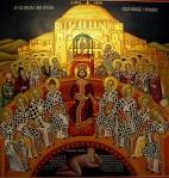 Christian Dogma
Christian Dogma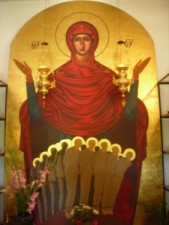 Christian Martyrs
Christian Martyrs Christian Orthodox Churches and Monasteries
Christian Orthodox Churches and Monasteries Christian Sermons and News
Christian Sermons and News Church's Teachings on Fasting
Church's Teachings on Fasting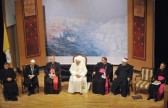 Ecumenism – a Great Heresy
Ecumenism – a Great Heresy Father George Calciu
Father George Calciu Life_a Sacred Gift form God
Life_a Sacred Gift form God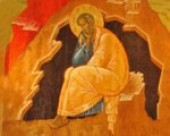 Orthodox Saints and Church Fathers
Orthodox Saints and Church Fathers Spiritual Elders
Spiritual Elders Daily Bible Readings
Daily Bible Readings Journey to Orthodoxy
Journey to Orthodoxy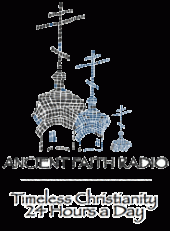 Listen to Ancient Faith Radio
Listen to Ancient Faith Radio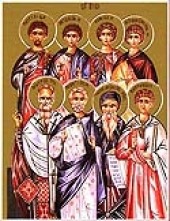 Orthodox Calendar of Feasts and Saints
Orthodox Calendar of Feasts and Saints Orthodox Christian Mission Center
Orthodox Christian Mission Center Orthodox Institute
Orthodox Institute OrthodoxChristianNetwork TV
OrthodoxChristianNetwork TV
More about Metropolitan John of Pergamon who had also presided the last pan-Orthodox meeting, held in Geneva, few years back. Are the Orthodox faithful aware of some of Mitr. John Zizioulas ideas?
He’s the author of a famous statement: “The Papal primacy is the most important issue of ecumenism”. So according to his idea, not Christian dogmas or Christian truth takes priority, not even the return of heterodox to the Orthodox Church, but … the problem of primacy, the role of the Pope, justified by Zizioulas as sole leader of the Church. No wonder, that Mitr. John was one of the proponents (and probably one of the creators) of the Agreement in Ravenna, which recognizes the Papal primacy as legitimate.
Other dubious ideas were also expressed by John Zizioulas with regards to the Uniates and Monophysites.
Another example of gravely twisting the teachings of the Holy Fathers is Zizioulas’s view on homosexuality, quoted by an Anglican publication (the Tablet): “When I raise the question of homosexuality he claims that the Greek Church is traditionally flexible and non-Judgement on such issues (!!!), but is now becoming more puritanical – due to Western Influence”. So, after Zizioulas, the Orthodox tradition does not condemn homosexuality, but the condemnation of this sin would be a Protestant influence!
What would the Ap. Paul, St. John Chrysostom and all the saints of the Orthodox Church would say about these serious and blasphemous statements? Here you have the “great theologians” preparing the Pan-Orthodox Council …